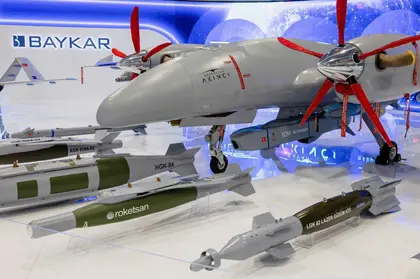The Turkish company Baykar Defense intends to add air-to-air missiles to its drones to shoot down kamikaze drones and even aircraft, according to the company’s CEO Haluk Bayraktar in an interview with Turkish publication Daily Sabah.
“Soon our Bayraktar TB2 and Akıncı will have air-to-air missiles; not only to engage drones but other enemy aircraft,” he explained, “We are conducting our tests.”
JOIN US ON TELEGRAM
Follow our coverage of the war on the @Kyivpost_official.
Instead of using expensive air-to-air missiles, the integration of such missiles into Akinci and Bayraktar TB2 combat drones could result in the development of a low-cost air patrol concept for eliminating threats like attack helicopters and enemy drones, including kamikaze drones.
A deal for the integration of the Sungur air defense missile to combat drones was signed at the SAHA Expo between Baykar and Turkish rocket and missile manufacturer Roketsan.
At the fair, Murat Ikinci, general manager of Roketsan, said Sungur is “a proven ammunition, especially against moving targets such as helicopters and drones. Using it from our unmanned aerial vehicles as an air-to-air missile will be a game changer.”
Since February, the Ukrainian army has used Baykar’s TB2 uncrewed combat aerial vehicles (UCAV) against the Russian invasion largely successfully.
In the meantime, Kyiv’s predicament has become more difficult as a result of Moscow’s recent introduction of Iranian “Shahed-136” drones. The wave of kamikaze drone attacks on energy facilities could result in a “large-scale disaster,” according to President Volodymyr Zelenskyy.

President Zelensky’s ‘Ramstein’ Address to Ukraine’s Allies
Currently, Ukraine employs fighter jets to attempt to intercept Russian kamikaze uncrewed aerial vehicles (UAVs), but using UAVs will be a more cost-effective option for them.
The kamikazes are slow, noisy and deployed at low altitudes, making them “easy targets,” said Bayraktar.
“In any case, you need to be ready with your countermeasures… We fully support Ukraine to defend their sovereignty,” Bayraktar stated.
In addition to opening a production facility in Ukraine within a year, Bayraktar, who holds a Ukrainian state medal, said his company wants to strengthen its relationship with Kyiv. The new facility will produce Baykar’s upcoming jet-powered drone Kzlelma (also known as “Red Apple”), according to Bayraktar.
After news of the TB2’s alleged assistance to Ukraine in sinking the Russian flagship missile cruiser Moskva in April, Russian criticism of Baykar increased. According to reports, Russian intelligence used deepfake technology to target Bayraktar personally.
“Unfortunately such things happen… but we are a huge team, we focus on our targets, not other noises,” Bayraktar said. He mentioned that Ukraine recently made history by being the first nation to use the TB2 for a naval mission, but he gave no further details.
Following successful operations in northern Syria, Libya, Nagorno-Karabakh, and most recently Ukraine, the Bayraktar TB2 has gained international fame and become an export success for Baykar since 2018.
According to reports, the drone was built with parts sourced from NATO allies Canada, Germany, and the U.S., leading some lawmakers to demand a ban on the transfer of technology to Baykar. The company immediately swapped out the imported parts for ones made domestically in Turkey, so the calls had no impact on the production of the well-known drones.
The Bayraktar TB2 combat drone is currently exported to 24 countries, from Africa to Central Asia and Europe, bringing in a $1 billion surplus, the company claimed, adding that 93 percent of the drone’s parts are currently made locally. In response to criticism that “dronified warfare” lowers the bar for war, Bayraktar said he disagrees.
He claimed that because drone technology offers superior precision and surveillance, it actually helps “eliminate collateral damage.” According to Bayraktar, strong trading partners like Germany and Turkey ought to put less emphasis on such worries and more emphasis on their defense cooperation.
You can also highlight the text and press Ctrl + Enter






